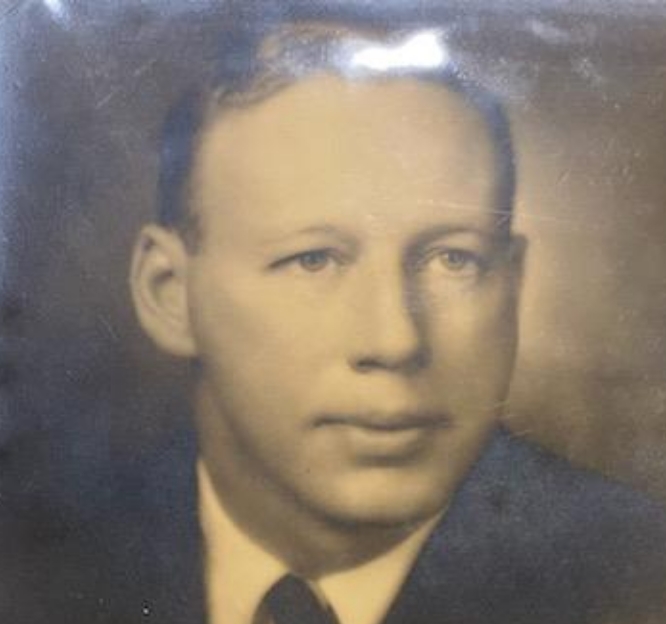WARREN SCRIPPS BOOTH
Generation 4

(1894-1987)
Second son of George and Ellen Booth.
Warren was schooled as an engineer, graduating from Yale Sheffield , the engineering school attached to Yale College. He served at the very end of World War I as an artillery officer in France. Though he might well have preferred an engineering career having early on assisted his older brother James in constructing the Bi-Autogo, he was pushed by his father into a career in newspaper management.
For decades he was President and Chairman of the Board of both The Evening News Association and Booth Newspapers. Serving as the head of both family newspaper companies, Warren effectively was head of the Scripps-Booth Clan. While both companies remained profitable, neither company expanded into any significant new markets. It should be noted, however, that Warren did oversee the take over of the Detroit Times in 1960, which gave the News the stronger position in the Detroit newspaper market. One might even say as a good engineer he was careful not to make mistakes.
Warren’s reign over both companies came to an end when in the 1960’s the U. S. Justice Department questioned the interlocking nature of the board of directors of the two companies which if considered as a single combined company would create a prohibited overlapping Michigan market and statewide media monopoly. As a consequence The Ypsilanti Press which overlapped the Detroit market and Ann Arbor market was sold by Booth Newspapers, and Warren Booth stepped down as President and Chairman of both companies. Warren’s place at the Evening News Association was filled by Peter Clark, his California born La Jolla cousin one generation younger, a great grandson of James E. Scripps and a grandson of Grace Scripps, the third and youngest daughter of James E. Scripps. Warren’s position as Chairman of Booth Newspapers went to Warren’s son-in-law Gordon Craig, who was married to his eldest child Barbara Booth.
NOTE: Warren Booth was a very hands on manager of both newspaper companies, but especially the Evening News Association. He only shared his power with a few trusted immediate male family members and a very few male cousins and in-laws. Since both companies were closely held, he treated them as if they were private. Family business was private business and not to be shared with “others”. This atmosphere of corporate confidentiality in part had been the business philosophy of James E Scripps, but it was also reinforced by the fierce local competition between The Detroit News and The Detroit Free Press.
Warren, for example, was adamantly opposed to giving Jack Booth a position on the Board of Booth Newspapers, but he was unable to prevent Jack from being elected a board member because the company allowed cumulative voting. In effect, Jack Booth forced the Board of Booth Newspapers to accept him as a director. This opposition to many family members extended to virtually every family member other than Warren Booth’s immediate family and close relatives. The Board of the Evening News following Warren’s departure included Peter Clark as President and Chairman, Richard Wallace Treasurer (Warren’s nephew), and Dick Spitzley (a Scripps in-law) Secretary. The Board of Booth Newspapers was Gordon Craig (Warren’s son-in-law) Chairman, Stephen Booth (Warren’s nephew) Secretary.
COMMENT: This pattern of only including the closest family members in management with a strong suspicion of the intentions, motivations, and loyalty of other family and “outsiders” appears to have been a very strong Scripps family trait, almost an article of faith. It was repeated again and again as family and clan members competed and litigated against one another causing several ruptures and partitions of media interests and even disinheritances. See SCRIPPS, THE DIVIDED DYNASTY, a History of the First family of American Journalism, by Jack Casserly, 1993, New York, Donald I. Fine, Inc, ISBN: 1-55611-378-1
OPINION: This philosophy of not sharing business information or including younger family members sowed seeds of distrust. In addition, shareholders of inherited Evening News stock were not able to sell their shares because there was no market to create a fair market price and the company rarely offered to repurchase shares and then only at a steep discount. All of this further alienated younger generations of shareholders and locked them in to a low yield investment. The policy of exclusion and refusal to create a liquid market for shares (carried out to a lesser extent at Booth Newspapers because that stock was a national over the counter listed company) made both companies targets for hostile take-over offers by outside interests. Ironically, when the possible sale of both Booth Newspapers and The Evening News became an issue, Warren Booth was a vocal seller along with his brother Henry Scripps Booth!
ANECDOTE: Every New Year’s Day the Detroit Club hosted a noon brunch and toast to the city. It was customary for members in town for the Holidays to attend with younger family members. It was a large and grand event, a gathering of what might be described as the great and good of the city. This particular New Year’s Day in the early 1980’s Jack Booth attended with his sons John and Ralph. As they were waiting to enter the main dining room at the club, Jack spotted his cousin Warren Booth, who was with his son Peter. Jack and his sons went over to greet their cousins. After exchanging greetings, Warren turned to his son Peter and said. “ You should get to know these boys because someday you will have to deal with them.”